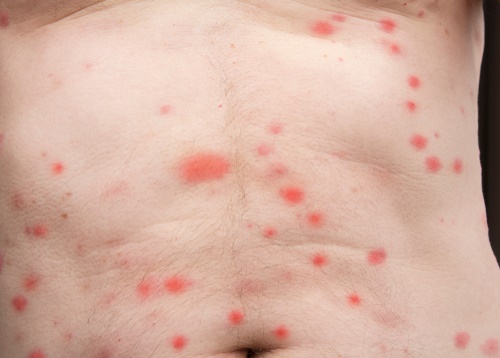Do I have fleas? One flea can multiply to millions in a matter of weeks, so if you assume that it’s still not much around your home, then you are making a huge mistake because you, your family and pets will continue to suffer from bites, daily.
Fleas

Fleas are parasitic insects that grow to 1-3 inch, tinier than the tip of a ball pen. Their colors range from black to reddish brown and they move by jumping with strong hind legs. Their bodies are flat and thin, covered with tiny microscopic hair which makes it easy for them to burrow into animal fur.
How does a flea bite appear?
Their bites are rather unique in appearance, if you know what you’re looking for, you will spot it with no stress. The common places on the human body to search are the lower legs, groin, armpits, waist, knees, elbows and back.
The affected spot becomes red in a matter of minutes after the bite, unlike other insect bites, it has a dark center.
The bump is in clusters of 3’s and four’s in the same area.
Signs of a bite
The first thing a person who was bitten will notice is the itchiness. Then the skin around that area becomes sore and irritated due to scratching.
This is where treatment is important, if you leave the spot untreated, you might be moved to scratch the itch excessively, open it up and it will be infected by harmful bacteria
Can flea bites lead to other health issues?
Rush your pet to a veterinarian to be sure no disease was transmitted in the infestation.
YES. They can transmit diseases through their bites to human and pets although the chance of fleas infecting your pet is higher.
How will I know if I have fleas in my house?
The common species – cat and dog fleas – choose animals as hosts. So, if you have pets, check them first for an infestation.
Your carpet and pet bedding will probably have dislodged adults hiding inside. Walk on your carpet and rugs with white socks, the tiny parasites are likely to be stuck underneath.
Can I get a flea infestation even if I do not have pets?
Fleas are not picky eaters; they are desperate little bugs that will jump on any mammal to survive. This means that they can hitch a ride on rodents, wild animals in your environment and even your neighbor’s pet.
Another important thing to remember is that they prefer shady hidden areas, so if you have tall grasses around you, they could be hidden right there.
If you do all these and still experience bites daily, then consult a doctor and a professional exterminator to evaluate the situation.
How do I treat flea bites?
Some bites will go away without treatment if you can endure the itching. If you cannot, there are over the counter medications available, the antihistamines and anti-itch creams usually soothe the itch.
However, the bites will not stop if you do not treat home and pets.
There are several pesticides you can administer but the most reasonable decision would be to leave the job to a professional. Depending on the level of infestation, you might need to vacate your home for a few days, the chemical used for treatment may be toxic.
Exterminate fleas for good
Flea collars are efficient in repelling them on pets and if you notice an infestation, take your pet to the vet for treatment, it may have been infected with other diseases. Don’t bring your pet back home until you completely rid your home of these pests or you will risk a re-infestation.